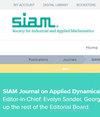渐近慢-快系统中的速率和分岔诱导转变
IF 1.8
4区 数学
Q2 MATHEMATICS, APPLIED
引用次数: 0
摘要
SIAM 应用动力系统期刊》,第 23 卷第 3 期,第 1836-1869 页,2024 年 9 月。 摘要.本研究提供了一种几何方法,用于研究一类非自治系统的分岔和速率诱导转换,在此称为渐近慢-快系统,可视为渐近自治和非自治系统(较小,或较大)之间的 "中间 "系统。在证明相关系统可被视为具有时间不连续性的极限系统的奇异扰动之后,我们基于几何炸毁技术建立了一个分析框架。然后,我们提供了在低维度上发生分岔和速率诱导转换的充分条件,以及在任意(有限)维度上 "跟踪 "的充分条件,即一个吸引的、正常的双曲流形在过渡体制中的持续性。证明依赖于几何膨胀、适用于非紧凑域的梅尔尼科夫方法变体以及一般不变流形理论。该形式主义适用于任意(有限)维度,以及具有前向和后向吸引子的系统,这些吸引子的特征是对时间的非三维(即非恒定)依赖。结果在低维应用中得到了证明。本文章由计算机程序翻译,如有差异,请以英文原文为准。
Rate and Bifurcation Induced Transitions in Asymptotically Slow-Fast Systems
SIAM Journal on Applied Dynamical Systems, Volume 23, Issue 3, Page 1836-1869, September 2024.
Abstract.This work provides a geometric approach to the study of bifurcation and rate induced transitions in a class of nonautonomous systems referred to herein as asymptotically slow-fast systems, which may be viewed as “intermediate” between the (smaller, resp., larger) classes of asymptotically autonomous and nonautonomous systems. After showing that the relevant systems can be viewed as singular perturbations of a limiting system with a discontinuity in time, we develop an analytical framework for their analysis based on geometric blow-up techniques. We then provide sufficient conditions for the occurrence of bifurcation and rate induced transitions in low dimensions, as well as sufficient conditions for “tracking” in arbitrary (finite) dimensions, i.e., the persistence of an attracting and normally hyperbolic manifold through the transitionary regime. The proofs rely on geometric blow-up, a variant of the Melnikov method which applies on noncompact domains, and general invariant manifold theory. The formalism is applicable in arbitrary (finite) dimensions, and for systems with forward and backward attractors characterized by nontrivial (i.e., nonconstant) dependence on time. The results are demonstrated for low dimensional applications.
Abstract.This work provides a geometric approach to the study of bifurcation and rate induced transitions in a class of nonautonomous systems referred to herein as asymptotically slow-fast systems, which may be viewed as “intermediate” between the (smaller, resp., larger) classes of asymptotically autonomous and nonautonomous systems. After showing that the relevant systems can be viewed as singular perturbations of a limiting system with a discontinuity in time, we develop an analytical framework for their analysis based on geometric blow-up techniques. We then provide sufficient conditions for the occurrence of bifurcation and rate induced transitions in low dimensions, as well as sufficient conditions for “tracking” in arbitrary (finite) dimensions, i.e., the persistence of an attracting and normally hyperbolic manifold through the transitionary regime. The proofs rely on geometric blow-up, a variant of the Melnikov method which applies on noncompact domains, and general invariant manifold theory. The formalism is applicable in arbitrary (finite) dimensions, and for systems with forward and backward attractors characterized by nontrivial (i.e., nonconstant) dependence on time. The results are demonstrated for low dimensional applications.
求助全文
通过发布文献求助,成功后即可免费获取论文全文。
去求助
来源期刊

SIAM Journal on Applied Dynamical Systems
物理-物理:数学物理
CiteScore
3.60
自引率
4.80%
发文量
74
审稿时长
6 months
期刊介绍:
SIAM Journal on Applied Dynamical Systems (SIADS) publishes research articles on the mathematical analysis and modeling of dynamical systems and its application to the physical, engineering, life, and social sciences. SIADS is published in electronic format only.
 求助内容:
求助内容: 应助结果提醒方式:
应助结果提醒方式:


